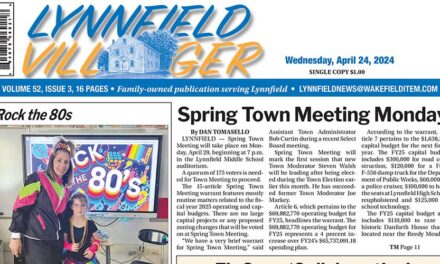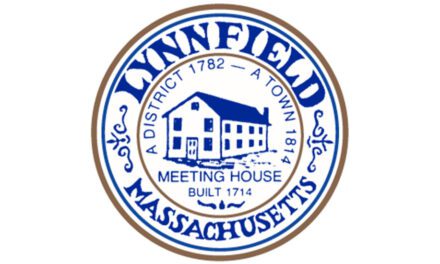Published November 7, 2018
By DAN TOMASELLO
LYNNFIELD — If Town Meeting approves the Summer Street road improvement project, construction will most likely begin in 10 years, Town Administrator Rob Dolan said during a community forum in the high school auditorium on Nov. 1.
The town has hired Bayside Engineering in order to begin the process of making infrastructure improvements to Summer Street. The town is looking to receive state and federal funds as part of a Massachusetts Department of Transportation (MassDOT) Transportation Improvement Plan (TIP) project.
The TIP project has been discussed twice in the last six months, including at a June meeting that featured 20 residents blasting the proposal.
“My goal tonight is to keep the conversation civil and professional,” said Town Moderator Arthur Bourque, who oversaw the forum. “This project will never happen unless it gets through Town Meeting, at which time there is going to have to be an appropriation to pay for engineering and some other stuff related to this project.”
Dolan gave an overview of the Summer Street TIP project to the two dozen residents in attendance.
“We are not here to sell this project,” said Dolan. “We are here to continue a very important community dialogue about whether or not the town of Lynnfield, particularly abutters, want to embark on a $15 million to $20 million infrastructure project on the most notable street in town.”
If the project gets approved, Dolan said he would be “shocked” if construction begins in 10 years.
“Most major TIP projects like this are close to a 20-year process,” said Dolan.
Dolan said the project would begin at Town Hall and would go to the Summer Street and Salem Street intersection, totaling two-and-a-half miles.
“There would be no land takings,” said Dolan.
Dolan said the project would include gas and water infrastructure improvements as well as roadway and sidewalk improvements. He said crosswalks and intersections would be upgraded as part of the project. He also said granite curbing would be installed and the Pillings Pond culvert would get reconstructed.
Bayside Engineering President Norman Brown said the project’s plans have been revised since June. As part of the first plan, Brown said the 43-foot layout would have two 11-foot travel lanes, two 5-foot shoulders on each side of the road to accommodate bicyclists and two 5-½ foot sidewalks on each side of the street.
Under the second proposal, Brown said the 50-foot layout for the project includes two 11-foot travel lanes, two 5-foot shoulders to accommodate bicyclists, two 7-½ foot grass strips and two 5-foot sidewalks.
Dolan said the Summer Street TIP project “must meet federal and state design guidelines,” which includes providing accommodations for bicyclists and pedestrians.
“We do have some freedom, but there are some rules we have to follow that prevent some of our freedom to make particular changes,” said Dolan. “There is far more freedom than restrictions.”
Dolan said the project would improve safety for bicyclists, pedestrians and motorists. He said the project would “decrease the negative impact from Summer Street drainage into Pillings Pond.”
Town Engineer Charlie Richter noted the town has been treating Pillings Pond as part of an effort to combat algae growth.
“We know the improvements we propose with this TIP project would improve water quality at Pillings Pond,” said Richter.
Dolan noted the town spends $1 million annually on road repairs and $25,000 to $50,000 annually on sidewalk repairs.
“In one full swoop, it’s more than we would spend in two decades,” said Dolan.
Dolan noted the new sidewalks would be in compliance with the Americans with Disabilities Act. He said roadway improvements would be designed to limit cars speeding on Summer Street.
“With proper design and input from people, there is a way to create a design that lowers speed and make(s) people a little more cognizant that they are driving in a small town,” said Dolan. “Speeding and bad driving are simply unacceptable.”
Dolan noted a TIP project undertaken in Lexington was able to save a number of historic trees along a well-known tree canopy in that community. If the Summer Street TIP project gets approved, Dolan said local officials would work to ensure Summer Street’s tree canopy remains standing tall.
Brown anticipated that the project’s survey and base plan would be prepared by next fall, and a pre-submission meeting with MassDOT would also take place in the fall of 2019. He anticipates the 25 percent design would be submitted to MassDOT in the summer of 2021 and comments on the project would take place in the winter of 2022. He said a design public hearing would most likely occur in the spring of 2022.
If the project gets approved, Brown anticipates construction would begin in 2026.
Reaction
After Brown and Dolan concluded the presentation, residents were given an opportunity to ask questions and make comments. Unlike the June meeting, the discussion was civil and polite.
A woman in the audience noted a number of the sidewalks on Summer Street are in poor condition. She inquired if the DPW has plans to patch sidewalks as part of a temporary solution.
DPW Director John Tomasz anticipates sidewalk repairs would begin in the spring.
“Sidewalks that are heavily traveled and are in poor or fair condition would get higher priority than areas that are in terrible condition and aren’t used as much,” said Tomasz.
In response to a question from a man in the audience, Brown said, “If Mass Highway determines your wall is on town property and needed to be moved to the front of your property, they would rebuild that.”
“It would be in the contract,” Brown added.
While serving as Melrose’s mayor, Dolan noted a contractor working on a TIP project in that city conducted an “inventory” of abutting properties before shovels went into the ground.
“There will always be one point person who is responsible for the job,” said Dolan.
Patrice Lane resident Pat Campbell aired concerns about having bicycle lanes on each side of Summer Street.
“We do not have moderate bicycle use in Lynnfield,” said Campbell. “There needs to be only one bicycle lane and it needs to be separated from the traffic. It’s too dangerous.”
Dolan said the project’s plans are subject to change and said he appreciated Campbell’s feedback.
“What this design provides is some space for cars and it does force people to go slower when they need to be cognizant of other things,” said Dolan. “For bicyclists to go one way, they need to come home. So you can’t have them on the same side.”
In response to another question from Campbell, Brown said temporary easements could be needed for the project.
“When the job is over, those easements go away,” said Brown.
A woman in the audience expressed concerns about small children using the bicycle lanes.
“I would never let my elementary school child ride in a bike lane that is on the street,” the woman said. “I would much prefer the bike lane being shared with the sidewalk than the cars.”
Dolan said small children would be using the sidewalks when riding their bikes around town.
A gentleman inquired how much the town would need to appropriate for engineering services for the project. Richter said between $1.5 million and $2 million would be needed for engineering costs.
A woman in the audience expressed concerns about people speeding on Summer Street, and said she wished “speed bumps” would be incorporated into the design.
In addition to aggressive traffic enforcement, Dolan said the way Summer Street is reconstructed could help reduce speeding.
A man expressed his support for the TIP project. “I think it helps the town,” he said.
Theresa Yulling, 560 Summer St., said motorists and bicyclists are constantly speeding on Summer Street.
“These bikers don’t abide by traffic,” said Yulling. “I am surprised they are not run over by cars. I am very much opposed to biking on the street. Our problem is how fast the cars are going. Something has to be done about the speed.”




